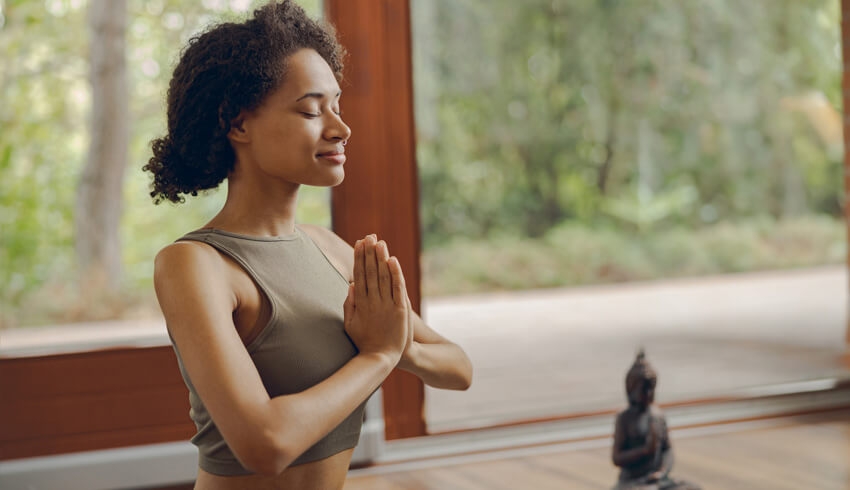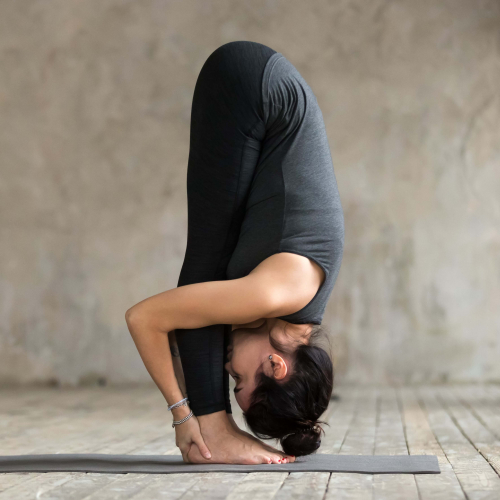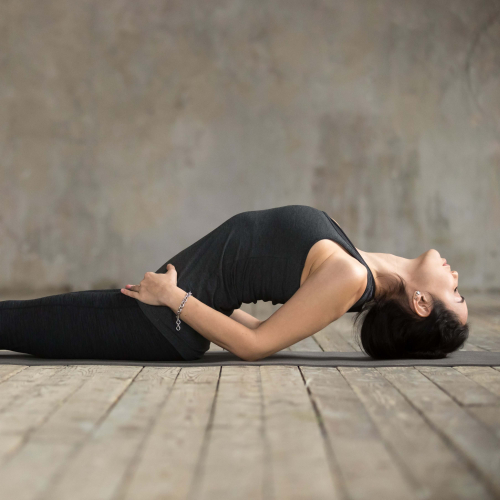Yoga is celebrated for its stress-busting and strength-building abilities. But did you know that it can also benefit your complexion? “Yoga glow” is a thing and, if you practice regularly, you’ve probably noticed the effects of exercise on your skin. Dr. Genieve Burley tells City Fit: “Moving your body is medicine. It allows for detoxification by flushing all of the organs, it increases respiration, it lubricates joints and strengthens muscles. Breathing and moving in yoga can help to balance hormones and move waste stagnating in the intestines.” All of this leads to healthier, happier skin.
Yoga and exercise pair beautifully with self care rituals that extend to skin care. Combining different self-care practices helps you boost your wellness by creating a holistic routine. A face mask or quick morning skin care routine encourages you to spend some quiet time focusing on yourself, much like yoga. Here is a closer look at the power of yoga for glowing skin, on and off the mat, as well as some complimentary skin care rituals you can include to feel renewed.
On The Mat: 5 Yoga Poses For Healthy Skin
Yoga benefits for the skin start on the mat. Dendy Engelman, MD tells SELF: “Yoga causes vasodilation (enlargement of the blood vessels), which leads to increased blood flow to the skin. This allows for more oxygen and nutrients to come to the skin’s surface, creating a cutaneous flushing or glow. Want that coveted yoga glow for yourself? Whether at home or in the studio, here are five yoga poses to inspire your practice and give you a glowing complexion.
Tadasana (Mountain Pose)
With its focus on deep, rhythmic breathing, this simple standing pose helps alleviate stress and improve oxygen flow. According to NDTV: “Getting in more oxygen through controlled breathing helps the body to release harmful toxins and keep the skin healthy and glowing.” By enhancing blood circulation, tadasana improves lymphatic drainage which brightens the complexion and reduces puffiness around the eye area.
How To Do Mountain Pose:
- Stand comfortably with your big toes touching and heels slightly apart
- Press the soles of your feet into the floor and engage your thighs, drawing them inward and upward
- Lengthen your tailbone toward the floor and draw in your belly
- Keeping your chin parallel to the mat, draw your shoulders back and down
- Soften your eyes and throat and let your arms hang beside your torso
- Optional: Raise your hands into a prayer position in front of your chest
- Close your eyes
- Inhale and exhale deeply for 5 breaths
Uttanasana (Standing Forward Fold)
Inversions are one of the best exercises to bring blood flow to the face and increase oxygen supply to skin cells. If you don’t have an opportunity for an entire yoga practice, take at least five minutes and turn upside down — it’s anti-gravity and gives the skin a healthy-looking glow.
How To Do A Standing Forward Fold:
- Stand in Mountain Pose with your hands resting on your hips
- Slowly exhale and bend forward from your hips (not your waist)
- Bend your knees as much as you need to relieve tension from your lower back
- Allow your head to hang heavy
- If possible, bring your palms to rest on the floor or against the back of your ankles; if not, cross your arms in front of you, holding your elbows
- With each inhalation, slightly lift and lengthen your torso; be mindful to avoid rounding your back
- Inhale and exhale deeply for 5 breaths
Parivrtta Sukhasana (Simple Seated Twist)
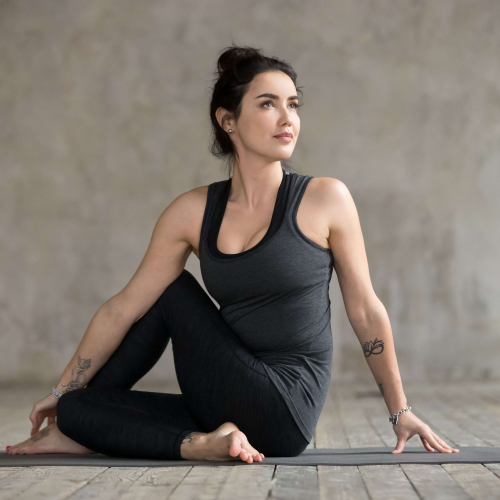
A healthy gut is essential for healthy skin. Dendy Engelman tells SELF: “Toxins not cleared from the body often get deposited in adipose fat tissue and in the skin, which can lead to acne, discoloration and accelerated aging.” Parivrtta sukhasana is a gentle, seated twist that assists in digestion and toxin removal by increasing circulation and energy to the stomach, small intestine, large intestine and liver.
How To Do A Simple Seated Twist:
- Sit on the floor in a cross-legged position (if your hips are tight, you may need to sit on a block or pillow)
- Align your head, neck and spine and lengthen your tailbone toward the floor
- Place your right hand flat on the floor behind you
- Place your left hand on the outside of your right knee
- As you exhale, gently twist to the right and gaze over your right shoulder
- On each inhale, lengthen your spine; on each exhale, twist more deeply
- Practice this for 5 breaths, then switch sides
Matsyasana (Fish Pose)
Another yoga pose for better skin is matsyasana, or fish pose. By gently stretching the throat muscles, fish pose helps flush your thyroid and parathyroid glands, thereby keeping hormones in check. Additionally, matsyasana has great anti-aging benefits. The Social says: “This pose gives a good stretch to the muscles of the face and throat which makes it one of the beneficial exercises to reduce the appearance of a double chin.”
How to do Fish Pose:
- Lie on your back with your knees bent and your feet flat on the floor
- Lift your hips and tuck your hands beneath your buttocks, palms down
- Draw your forearms and elbows in tight towards your body
- On your inhale, press your forearms and elbows into the floor and gently arch your back to lift your torso up and away from the floor
- Elongate your spine by firming your shoulder blades and lifting your chest higher
- Gently tilt your head backward, letting the crown of your head rest on the floor
- Keep your legs engaged
- Inhale and exhale for 5 breaths
Bhujangasana (Cobra)
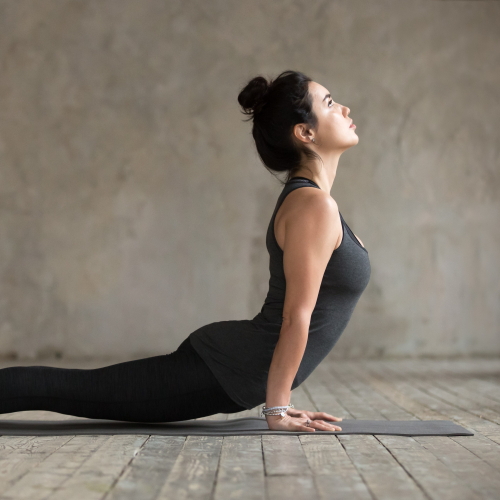
Stress is one of the worst offenders for skin woes. Genieve tells us: “Emotional stress takes a huge toll on your hormones and your skin. When you live in harmony with work, friends and commitments, your stress is reduced and your skin can glow.” Cobra pose helps reduce tension, stress and fatigue by opening your lungs and energizing your body. This pose, and others in yoga, help your wellness by lowering cortisol (the “stress hormone”) and reducing oxidative stress. An added benefit? This also minimizes and prevents the visible signs of skin aging brought on by dehydration and loss of elasticity.
How to do Cobra Pose:
- Lie on your belly
- Stretch your legs out behind you with your knees touching and the tops of your feet resting on the floor
- Spread your hands on the floor beneath your shoulders and hug your elbows into your sides
- Press your feet and thighs firmly into the floor
- On your inhale, gently straighten your arms to push your chest forward and up off the floor. Arms may still hold a bend if you have reduced flexibility.
- Slowly roll your shoulders back and away from your ears to elongate your neck
- Hold for 5 breaths
Exercise is crucial for a healthy body, healthy mind and glowing skin. There are a few more ways that you can reach these goals for optimal results.
Off The Mat: Healthy Body, Healthy Skin
The benefits of yoga for skin are just one aspect of overall wellness. Yoga Teacher Becky Stefani appreciates the value of yoga but also maintains a nourishing skin care routine as an essential part of her approach to health and wellbeing. You can watch her skin care routine below.
In addition to enjoying a yoga session, our Lead Skin Care Trainer, Natalie Pergar, believes a scalp massage or a holistic skin care routine also offers relaxation benefits. Watch this In The Mix video to learn about the benefits of different wellness activities.
Tip 1: Embrace Yoga Principles
Yoga isn’t just about poses. It has principles that you can bring into your daily life for benefits for your skin and wellbeing. One of yoga’s core principles is the five niyamas (observances) which are tools for cultivating happiness, humility, self-discipline and inner strength. The niyamas are the second limb of the “Eight Limbs of Yoga.” You can find ways to practice them in everyday situations in life.
The first niyama, Shaucha, means “purification” or “cleanliness.” According to Yoga International, shaucha offers techniques for cleansing the body and mind, creates the foundation for bodily health and acts as the pathway to deeper states of meditation.
The second is Samtosha (contentment). This refers to looking to yourself for contentment and happiness rather than yearning for the things you don’t have and coveting the possessions of others. You can practice this through gratitude and by not blaming yourself for circumstances beyond your control.
Have you ever tried to break a bad habit? Or free yourself of particular thoughts? The third principle is Tapas (self-discipline), a yogic practice of intense self-discipline and will power. This principle involves disrupting habitual thought and behavioral patterns to better your life and breakthrough discomfort. For example, wanting to adopt dietary habits that support your skin and body’s health. Genieve says: “We have layers of the epidermis in the gut and in the skin, so what we put in the gut will reflect on your skin.” A diet rich in plant-based foods and antioxidants can help to minimize wear and tear on your skin caused by environmental stressors like the sun, seasonal changes and pollution.
The fourth principle is Svadhyaya, the study of the self, and the practice of self-reflection and self-study. Unlike the Western understanding of self-study, which carries the concept of psychoanalysis, yogis have a different interpretation in mind. As Yoga International states: “Like the waves of the sea, it is said that individual awareness is never separate from the infinite consciousness in which it has its being. Each mind is a wave in a vast expanse of consciousness. Individual minds have distinctive qualities, preferences and colorings, but they are not entirely autonomous. The aim of svadhyaya is to bring the experience of that immense Consciousness, the Self, to awareness.”
And lastly, Ishvara Pranidhana is the 5th principle, often translated as “surrendering to God.” Regardless of your beliefs, think of this as either devoting one’s work to a higher power or ridding oneself of ego-focused desires. The Niyamas give ethical guidelines that lead to inner peace, which reduces stress and affects the skin positively for a healthy, clear complexion.
Tip 2: Wind Down With A Skin Care Mask
Regular facial masking will keep your skin soft and supple. Plus, masks treat any type of skin issue you may have: aging skin, oily skin, dehydrated skin, problem skin, uneven skin — never fear, there’s a formula for it. With so many options out there, it might seem overwhelming to choose the right face mask. That’s why we’ve collated a face mask guide to narrow down the options for your specific complexion.
We suggest including a face mask in your self-care routine once or twice a week, perhaps while meditating or during a gentle yoga session. Masking should occur after cleansing and toning. These steps ensure you have clean skin before locking in the nutrients from a mask.
When masking, it’s also fun to play around with mixologies that layer and blend a variety of treatments. Our face mask guide provides recommendations on how to mix and match your masks depending on your concerns. So, unroll your mat, get into the lotus position and let your skin absorb the benefits of a mask.
Tip 3: Adopt Meditation
Meditation is a part of yoga that teaches you mental relaxation and concentration. The goal is to break free from digressive thinking so that we are not held hostage to our emotions and merely react. Neuroscientist and Waking Up meditation founder Sam Harris breaks down the practice to these beginner meditation instructions:
-
Sit comfortably, with your spine erect, either in a chair or cross-legged on a cushion.
-
Close your eyes, take a few deep breaths and feel the points of contact between your body and the chair or floor. Notice the sensations associated with sitting — feelings of pressure, warmth, tingling, vibration, etc.
-
Gradually become aware of the process of breathing. Pay attention to wherever you feel the breath most clearly — either at the nostrils, or in the rising and falling your abdomen.
-
Allow your attention to rest in the mere sensation of breathing. (There is no need to control your breath. Just let it come and go naturally.)
-
Every time your mind wanders in thought, gently return it to the sensation of breathing.
-
As you focus on the breath, you will notice that other perceptions and sensations continue to appear: sounds, feelings in the body, emotions, etc. Simply notice these phenomena as they emerge in the field of awareness, and then return to the sensation of breathing.
-
The moment you observe that you have been lost in thought, notice the present thought itself as an object of consciousness. Then return your attention to the breath — or to whatever sounds or sensations arise in the next moment.
-
Continue in this way until you can merely witness all objects of consciousness such as sights, sounds, sensations, emotions and even thoughts themselves as they arise and pass away.
-
Don’t fall.
Meditating for just a few minutes a day can relieve stress in our daily lives, which in turn can help our skin. If we look at severe skin issues and cases of psoriasis, one study tested the hypothesis that stress reduction methods based on mindfulness meditation can positively influence the rate at which psoriasis clears in patients. The results supported this hypothesis. Scholarly articles also state: “As part of the total care of the psoriasis patient, physicians are urged to augment traditional psoriasis treatment regimens with stress-reduction strategies, such as biofeedback, meditation and self help approaches.”
Tip 4: Skin Rejuvenating Product Ideas
Equally important to your health is treating your skin from the outside in. Genieve tells us: “We need products that are packed with nutrients and made with natural ingredients, like plants. Our skin recognizes elements from nature, not synthetics.” Natural and organic products filled with vitamins, minerals and antioxidant-rich ingredients are extremely beneficial for a healthy and youthful-looking complexion.
Yoga Journal’s beauty experts recommend our Firm Skin Acai Exfoliating Peel, Facial Recovery Oil and Rosehip & Lemongrass Lip Balm to keep your skin looking healthy and youthful. Packed with antioxidants sourced from acai berry, grapefruit and goji, the Firm Skin Acai Exfoliating Peel leaves your skin looking tighter and firmer. To feel calmer and more balanced, follow up with the hydrating and revitalizing Facial Recovery Oil, formulated with clary sage oil and ylang ylang. Finally, complete your mini stress-relieving skin care routine with the Rosehip & Lemongrass Lip Balm, an all-natural SPF 15 formula that defends dry lips.
Do you have any favorite mask mixologies or products to enhance your wellness and reveal your healthiest skin? We’d love to hear them! Share them with us in the comments below and join the conversation on social media.
This article was originally written in August 2018.
